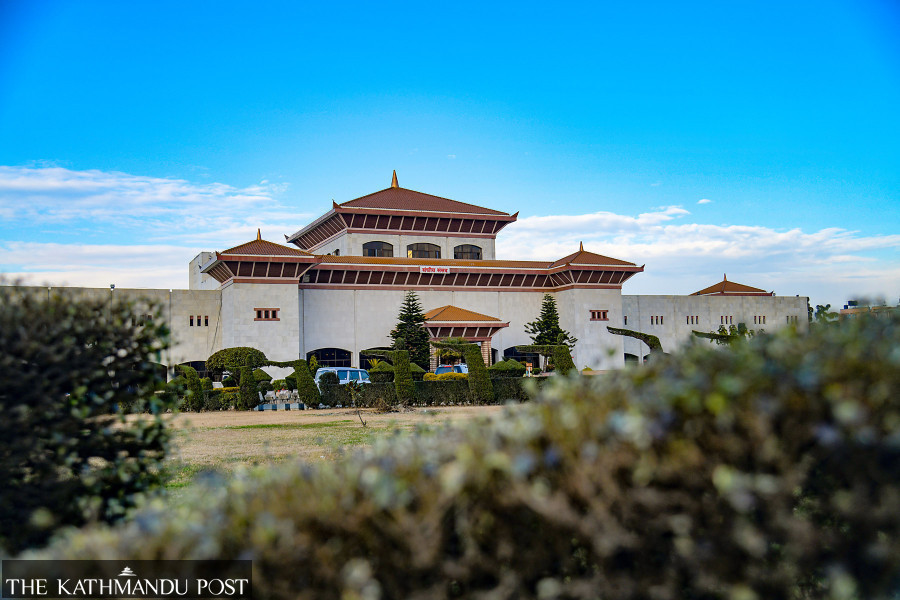National
House session begins with renewed focus on effectiveness
Main opposition leader Oli stresses making transitional justice bill victim-centric before passing it with consensus.
Post Report
Amid criticism of falling short to adopt crucial laws in the last session, the House of Representatives is now gearing up for a fresh start in line with the new calendar for the current session, which started Monday.
The last session of the House of Representatives, which saw just one bill passed in its 65 meetings spanning over 180 days, was acknowledged as a matter of shame by both political leaders and parliamentarians.
Ahead of starting the winter House session, the business advisory committee of the House of Representatives on Monday approved the new 22-day calendar of events for the lower house.
“We have come up with a new calendar,” said Devraj Ghimire, Speaker of the House of Representatives while addressing the first meeting of the winter session.
“In order to make parliamentary activities more effective and manageable, the ongoing session needs to commit to passing crucial new laws,” said Ghimire.
The new calendar will be effective until February 27, before which there will be seven meetings of the lower house. As per the calendar, the question-answer between the prime minister and lawmakers has been fixed for February 7, Wednesday.
Besides adopting the new calendar, electronic attendance of the lawmakers will be taken during the house session, according to Ghimire. Details of the electronic attendance will be released on the Parliament’s website.
“Starting this session, we will implement some new practices to make the Parliamentary business effective and active,” said Ghimire. “We will discuss the principles and priorities of the budget, taking into account the feedback from previous budget discussions. We will also work to implement a time-bound agenda to streamline parliamentary activities.”
In the past year, the parliament passed just one bill on usurious lending.
“That is why there are lots of questions over us,” Ghimire said at the meeting of the business advisory committee, adding, “Now we must work to address the shortcomings of the past session.”
In between House sessions, there will be back to back meetings of various parliamentary committees. This House session is expected to discuss and approve some crucial bills including one related to the transitional justice system.
In the past sessions, the leaders of major parties represented in the House used to speak on the first day of the session, but this time, the tradition was broken.
There are some issues that major political parties have yet to sort out regarding the bill on the transitional justice system. The government has tabled the Act on Commission on Investigation of Disappeared Persons, Truth and Reconciliation, 2071 (Third Amendment) Bill in Parliament.
“The bill should ensure that no violence is repeated in the country,” said KP Oli, leader of the main opposition party, on Monday in Janakpur. “There are some issues that need to be addressed jointly and the bill should be approved by consensus.”
Although signed in 2007, the transitional justice system remains bogged down despite the parties pledging to complete the remaining tasks of the peace process within six months of the signing.
Significant progress was made later when the Maoists rebels surrendered their arms and troops. The arms were sent to the government deposit, some former rebels joined the Nepal Army and disqualified combatants were sent home with financial support for their livelihood.
“The TRC process should be victim-centric. The victims of the decade-long insurgency should be given justice,” said Oli. “The peace process should be concluded as per international standards and in line with the past verdict of the Supreme Court.”
“We have to ratify the TRC bill but there are some provisions that need to be addressed… I don’t see any reason not to address them properly…Those involved in crimes against humanity should be punished. The TRC law should ensure that there won’t be impunity, and it should ensure that there will be no violence in Nepal anymore,” said Oli.
As per the calendar of events, on Wednesday, the party leaders represented in the House will make their statements, pass some laws including one on money laundering. The question-answer with the prime minister is also set for the same day.
After Wednesday, the House will next sit on February 18 where another question-answer session with the prime minister has been scheduled.
On the same day besides zero hour, some bills will be tabled. Then, on February 22, some bills will be tabled and zero hour will be continued.
After that, on February 23, besides zero hour, line ministries will reply to queries raised by lawmakers and some bills will be tabled and discussed.
And on February 25, more regular activities like zero hour, tabling and discussing of the new bill have been planned. A pre-budget discussion will start on February 26.
“The government should focus on the livelihoods of the people, said Rabi Lammichhane, the president of the Rastriya Swatantra Party, speaking outside the Parliament building. “If the government fails to do so, our party will caution the government. If the government fails to introduce bills related to the livelihood of the people, our party will bring private members’ bills.”




 10.12°C Kathmandu
10.12°C Kathmandu













